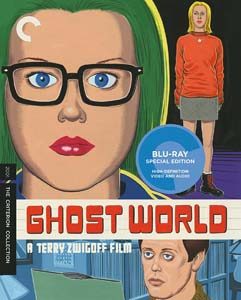NDSU Spectrum: Movie review
Living in a melancholy ‘World’
By JOHN HANSEN
nov. 9, 2001
Most films about teenagers take us through the process of disillusionment. A character starts out loving the world, then they become cynical, then — depending on whether it’s a sad or happy film — they become suicidal or they decide life really isn’t that bad after all.
“Ghost World,” now playing at the Fargo Theatre, isn’t like that. Instead of cramming these “stages” of growing up into two hours, it zeroes in on the cynicism of its main character, played by Thora Birch, who gives the most expressive one-expression performance since Kurt Russell in “Soldier.”
Based on an acclaimed graphic novel by Dan Clowes and directed with understatement by Terry Zwigoff, “Ghost World” is the best sarcasm-laced “meaning of life” film since “American Beauty.” It suggests that we really just need one person to hold onto, and failing that, we at least need to know ourselves. And failing that, we at least need a dream.
At first glance, “Ghost World’s” cynical leads call to mind Daisy and Shelby from the 1999 TV series “Higher Ground.” But Daisy and Shelby had problems; Enid (Birch) and Rebecca (Scarlett Johansson) are past theirs. These girls are more comfortably sad than a Pete Yorn song.
To stave off boredom, these high school grads make fun of everyone — the valedictorian who was in a drunk driving accident, the Satan-esque couple in the diner, the overly peppy girl who keeps asking them to call her. But when they get to know one of their targets, things begin to change.
Pretending to respond to a particularly pathetic personal ad, Enid, Rebecca and their reluctant friend Josh (Brad Renfro) lure a cardigan-wearing man named Seymour (Steve Buscemi, finally given a role to sink his funny-shaped teeth into) to a diner and prepare to enjoy his humiliation when the woman fails to show up. But after a few hours, it ceases to be funny.
Enid buys a record from Seymour at a garage sale, and befriends this man who seems to be “the opposite of everything I hate.” As they listen to an annoying radio station (or is that redundant?), Seymour comments that he can’t relate to 99 percent of the population (which raises an interesting philosophical thought: what percentage of the audience related to that statement?).
Enid is determined to hook Seymour up with a woman because “I don’t want to live in a world where a guy like you can’t get a date.” In one of many poignant/funny scenes, a woman in a bar comments on the blues musician on stage. Seymour explains, “Well, technically it’s not blues. It would actually be classified as ragtime, but not in the classic definition of piano ragtime in the tradition of Scott Joplin…”
Back at Seymour’s apartment, Enid finds an old poster for Coon’s Chicken Inn, which she is surprised to learn was the original name of Cook’s Chicken Inn. “People still hate each other,” Seymour says. “They’re just better at hiding it now.”
Through Seymour’s collection of old stuff, Enid’s intentionally outdated clothes, and even the old-fashioned name “Enid,” “Ghost World” strips away all the superficial crap of the world, and leaving us with… well, crap, but at least its meaningful crap.
The restraint displayed by Clowes and Zwigoff is admirable. Lesser filmmakers could have pumped up the controversy factor of a romance between an 18-year old girl and a man three decades older; here, it’s a side note.
And the final scene of the old man on the bus stop bench is brilliantly poignant; you’ll understand why when you see it. “Ghost World” is the best film of 2001.
Title: “Ghost World”
Starring: Thora Birch, Scarlett Johansson, Steve Buscemi, Brad Renfro, Illeana Douglas, Bob Balaban
Written by: Dan Clowes and Terry Zwigoff
Director: Terry Zwigoff
Grade: A+

